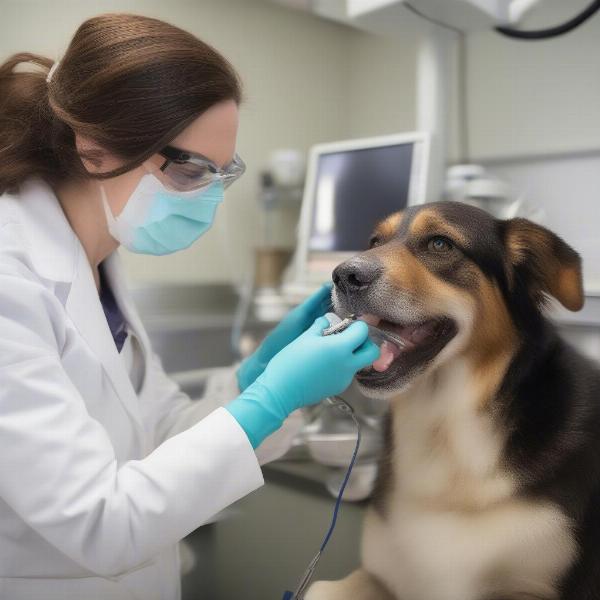Dental care is a crucial aspect of your dog’s overall health. Many owners wonder, “How often do dogs need dental cleaning?” While daily brushing is ideal, professional cleanings are also essential for preventing serious health issues. This article will delve into the importance of dog dental cleanings, how often they are needed, and what to expect during the procedure.
Understanding the Importance of Dog Dental Cleanings
Just like humans, dogs can develop plaque and tartar buildup, leading to gingivitis, periodontal disease, and even tooth loss. These dental problems can cause significant pain and discomfort, affecting your dog’s ability to eat, play, and enjoy life. Moreover, bacteria from dental infections can enter the bloodstream and impact other organs, such as the heart, liver, and kidneys. Regular dental cleanings help remove plaque and tartar, preventing these serious health problems.
 Dog Dental Cleaning Process
Dog Dental Cleaning Process
How Often Should Your Dog Get a Professional Cleaning?
The frequency of professional dental cleanings varies depending on the individual dog. Factors such as breed, age, diet, and chewing habits can influence the rate at which plaque and tartar accumulate. Generally, most dogs benefit from a professional cleaning once a year. However, some dogs with a predisposition to dental issues may require cleanings every six months, while others with excellent dental hygiene might only need them every two years. Your veterinarian can assess your dog’s individual needs and recommend an appropriate cleaning schedule.
Signs Your Dog Needs a Dental Cleaning
- Bad breath
- Red or swollen gums
- Loose or missing teeth
- Difficulty chewing
- Excessive drooling
- Pawing at the mouth
What Happens During a Dog Dental Cleaning?
A professional dog dental cleaning is performed under general anesthesia to ensure your dog’s safety and comfort. The procedure involves a thorough examination of the teeth and gums, followed by scaling and polishing to remove plaque and tartar. The veterinarian will also check for any signs of infection or disease. If necessary, dental X-rays may be taken to assess the health of the teeth below the gum line. dog licking his mouth After the cleaning, a fluoride treatment may be applied to help strengthen the enamel and protect against future plaque buildup.
At-Home Dental Care for Dogs
While professional cleanings are essential, daily brushing is the most effective way to maintain your dog’s oral health between visits. Use a toothbrush and toothpaste specifically designed for dogs, as human toothpaste can be harmful to pets. apple dog toy You can also provide dental chews and toys that help remove plaque and tartar buildup.
Conclusion
Regular dental cleanings are vital for your dog’s overall health and well-being. By understanding how often your dog needs a professional cleaning and incorporating daily at-home care, you can help prevent dental disease and ensure your furry friend enjoys a happy, healthy life. Don’t hesitate to discuss your dog’s dental health with your veterinarian and establish a personalized care plan. dog grooming snohomish
FAQ
- How much does a dog dental cleaning cost? The cost can vary depending on location and the specific procedures required, but generally ranges from $300 to $700.
- Can I clean my dog’s teeth myself? While daily brushing at home is encouraged, professional cleaning under anesthesia is necessary to remove tartar below the gum line.
- Are there any risks associated with dog dental cleaning? As with any procedure involving anesthesia, there are some risks. However, these are generally low, and your veterinarian will take precautions to minimize them. rubber toy dog
- What can I do to prevent dental disease in my dog? Daily brushing, dental chews, and regular veterinary checkups are the best ways to prevent dental disease.
- How will I know if my dog has dental pain? Signs of dental pain can include bad breath, red or swollen gums, difficulty chewing, and excessive drooling.
- Is anesthesia always required for dog dental cleaning? Yes, anesthesia is typically required for a thorough and safe cleaning.
- Can dental disease in dogs be reversed? While the damage caused by periodontal disease cannot be reversed, regular cleanings can help prevent further progression. dog whelping box
ILM Dog is your trusted source for expert advice on dog care and breeds. We offer a wide range of resources to help you provide the best care for your canine companion, covering everything from health and nutrition to training and behavior. Whether you’re a new dog owner or a seasoned expert, ILM Dog is here to support you every step of the way. Contact us today at [email protected] or +44 20-3965-8624 to learn more about our services and how we can help you and your furry friend. Visit us at ILM Dog.